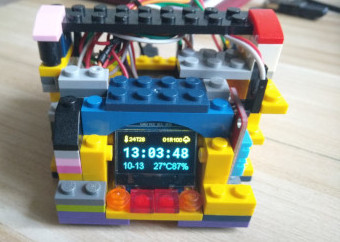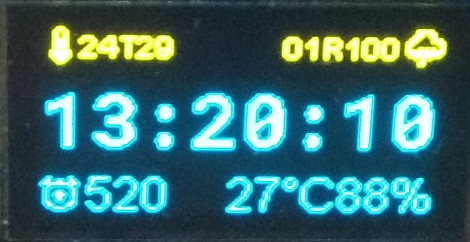本文介绍如何使用python将图片转换为纯黑白的单通道图片。文中用到的脚本支持彩色、灰度、带alpha通道的输入图片以及SVG矢量图,支持调整输出图片大小以及设置灰度阈值。
最后介绍如何输出SSD1306 OLED显示屏可用的XBM文件,并利用输出的XBM数据在0.96寸的OLED屏幕上显示图标,例如下图中的温度、闹钟及云朵图标通过本脚本生成:


使用方法
通过pip安装依赖包:
pip3 install --user pillow argparse numpy cairosvg
从下文拷贝python脚本为tobw.py.
要把非单通道图片(如彩色、灰度或带alpha通道的PNG图片)转换图片 只需指定输入图片路径和输除路径即可:
$ python tobw.py -i input.png -o output_bw.jpg
通过-h选项查看其他可选参数:
$ python tobw.py -h
usage: tobw.py [-h] -i INPUT_IMAGE -o OUTPUT_IMAGE [-t THRESHOLD] [-r] [-s SIZE] [-p]
optional arguments:
-h, --help show this help message and exit
-i INPUT_IMAGE, --input-image INPUT_IMAGE
Input image
-o OUTPUT_IMAGE, --output-image OUTPUT_IMAGE
output image
-t THRESHOLD, --threshold THRESHOLD
(Optional) Threshold value, a number between 0 and 255
-r, --invert-bw (Optional) Invert black and white
-s SIZE, --size SIZE (Optional) Resize image to the specified size, eg., 16x16
-p, --print (Optional) Print result
-s 缩放图片
使用-s选项设置输出图片的大小,不设置时,输出与输入大小相同。例如把输出图片设置微16X16像素大小:
python3 tobw.py -i input.png -o output_bw.jpg -s 16x16
需要注意如果输出图片长宽比与输入图片长宽比不一致,图片会被拉伸或压缩。
-t 调整阈值
使用-t选项设置输出为黑或白像素点的灰度阈值,取值范围为0-255. 值越小就有更多像素点被设置为白色。如果输出图片丢失的细节过多时,可以适当调整本参数。
反转输出的黑白像素
使用-r参数后,原来输出白色的像素点将显示微黑色,反之亦然。输入图片的明暗区域恰好与显示屏相反时可以使用本参数。
在ESP8266 Arduino里使用
使用esp8266-oled-ssd1306库提供的drawXbm(x, y, img_width, img_height, img)方法在屏幕上绘制图片,drawXbm的5个参数分别是
x, y: 图片的坐标,屏幕左上角坐标为(0, 0)。此处设置的坐标对应图片左上角位置。img_width: 图片的实际宽度。img_height: 图片的实际高度。img: XBM图片字节,使用tobw.py的-p参数获取。
esp8266-oled-ssd1306使用XBM格式图片,使用tobw.py的-p参数获取,例如下面的示例把svg图片转换为12x12像素输出,并打印XBM格式数据。注意返回的im_bits,这就是drawXbm最后一个参数需要的数据。
$ python3 tobw.py -i rain.svg -o rain_bw.jpg -s 12x12 -t 200 -p
111000001111
110001000111
110011100011
100111110001
001111111100
011111111110
001100000100
000000000000
100000000001
111000001111
111100111111
111100111111
Result as XBM image:
#define im_width 12
#define im_height 12
static char im_bits[] = {
0x07,0x0f,0x23,0x0e,0x73,0x0c,0xf9,0x08,0xfc,0x03,0xfe,0x07,0x0c,0x02,0x00,
0x00,0x01,0x08,0x07,0x0f,0xcf,0x0f,0xcf,0x0f
};
源码
# Convert image to pure black and white
# Show usages:
# python tobw.py -h
# python tobw.py -i rain.svg -o rain_bw.jpg -s 12x12 -t 200
from PIL import Image, UnidentifiedImageError
import argparse
import numpy as np
from cairosvg import svg2png
import os
from random import random
ap = argparse.ArgumentParser()
ap.add_argument("-i", "--input-image", help="Input image", type=str, required=True)
ap.add_argument("-o", "--output-image", help="output image", type=str, required=True)
ap.add_argument("-t", "--threshold",
help="(Optional) Threshold value, a number between 0 and 255", type=int, default=128)
ap.add_argument("-r", "--invert-bw",
help="(Optional) Invert black and white", action='store_true')
ap.add_argument("-s", "--size", help="(Optional) Resize image to the specified size, eg., 16x16", type=str)
args = vars(ap.parse_args())
invert_bw = args['invert_bw']
threshold = args['threshold']
if threshold > 255 or threshold < 0:
raise Exception('Invalid threshold value!')
img_in = args['input_image']
img_out = args['output_image']
if args['size']:
size = [int(n) for n in args['size'].lower().split('x')]
else:
size = None
high = 255
low = 0
if invert_bw:
high = 0
low = 255
def replace_ext(filename, new_ext):
ext = filename.split('.')[-1] if '.' in filename else ''
return filename[:len(filename)-len(ext)] + str(new_ext)
def remove_transparency(im, bg_colour=(255, 255, 255)):
# https://stackoverflow.com/questions/35859140/remove-transparency-alpha-from-any-image-using-pil/35859141
# Only process if image has transparency (http://stackoverflow.com/a/1963146)
if im.mode in ('RGBA', 'LA') or (im.mode == 'P' and 'transparency' in im.info):
alpha = im.convert('RGBA').getchannel('A')
bg = Image.new("RGBA", im.size, bg_colour + (255,))
bg.paste(im, mask=alpha)
return bg
else:
return im
# color image
try:
col = Image.open(img_in)
except UnidentifiedImageError:
if (img_in.lower().endswith('.svg')):
tmp = replace_ext(img_in, '{}.png'.format(random()))
svg2png(url=img_in, write_to=tmp)
col = Image.open(tmp)
else:
raise Exception('unknown image type')
if size:
col = col.resize(size)
col = remove_transparency(col)
gray = col.convert('L')
bw = gray.point(lambda x: low if x < threshold else high, '1')
bw.save(img_out)
for u8 in np.uint8(bw):
print(''.join(str(c) for c in u8))
print()
print('Result as XBM image:')
if (img_out.lower().endswith('.xbm')):
print(open(img_out).read())
else:
xbm_out = replace_ext(img_in, '{}.xbm'.format(random()))
bw.save(xbm_out)
print(open(xbm_out).read())
os.remove(xbm_out)
if tmp is not None:
os.remove(tmp)